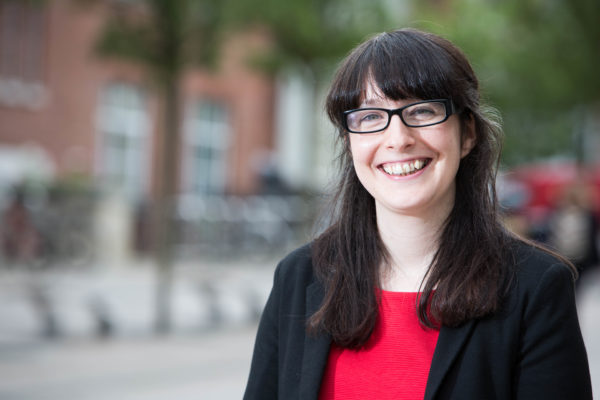Priestley prizewinner Kate Scott to help shape UK industrial strategy

University of Leeds Research Fellow Kate Scott has been awarded a NERC Industrial Innovation Fellowship on implementing a climate compatible Industrial Strategy for the UK.
Through the Fellowship, Dr Scott, who was the Priestley Centre’s inaugural Piers Sellers PhD prizewinner (2016), will develop methods to downscale global climate assessments for local-level decision making across sectors in order to facilitate the delivery of a climate compatible Industrial Strategy.
The project brings together climate science, government policy and private companies to ensure tackling climate change is incorporated into building a resilient, sustainable and competitive future for UK industry. Dr Scott will be working with Tata Steel and the Department for Business, Energy and Industrial Strategy (BEIS) to identify policy frameworks to incentivise ambitious material productivity measures.
“This interaction with business and policy makers is key to gaining consensus and developing long lasting actions to mitigate climate change” said Dr Scott, who is a Research Fellow for the EPSRC funded Centre for Industrial Energy, Materials and Products (CIE-MAP).
The Industrial Strategy outlines the government’s plans to improve living standards and economic growth. A national productivity fund worth £23 billion was set up to support the strategy, with some funding directed towards enhancing the UK’s position as a world leader in science and innovation.
NERC – the Natural Environment Research Council – is investing nearly £9M in early career researchers to ensure that the UK industrial sector has a supply of skilled researchers.
The government’s vision for UK industry will have implications for the carbon it will emit. The UK recently ratified The Paris Agreement committing itself to limiting temperature increase to below 2°C, meaning the Industrial Strategy needs to build an economy consistent with its climate commitments.
Large climate assessments, such as those by the Intergovernmental Panel on Climate Change (IPCC), have been key to identifying global challenges, yet have less formal connections to local-level sector considerations, which is where decisions on the Industrial Strategy will be taken.
“It’s not just about clean energy technologies,” said Dr Scott. “It’s also about how we can improve the material productivity of UK sectors – to deliver low carbon infrastructure, for example.”
She hopes to use her fellowship as a platform on which to build an interdisciplinary research group and to lead research at the point at which disciplines need to come together to help find solutions for challenges faced by climate change.
“I am excited to be working at the point where disciplines come together to think about mitigating climate change,” said Dr Scott. “For example, I will be thinking about what uncertainty in climate modelling means for setting carbon budgets, and then talking to businesses and policy makers about what action is needed to meet these budgets.”
